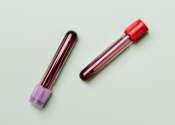Last update:
Alzheimer's disease & dementia news
Neuroscience
Alzheimer's disease can be reversed in animal models to achieve full neurological recovery
For over a century, Alzheimer's disease (AD) has been considered irreversible. Consequently, research has focused on disease prevention or slowing, rather than recovery. Despite billions of dollars spent on decades of research, ...
Dec 24, 2025
0
237
New ALS drug stabilizes decline with a trend toward improved strength and mobility for some
Historically, people with amyotrophic lateral sclerosis (ALS) experience a relentless decline in neurological function that eventually robs them of the ability to move, speak, eat or breathe. Now, researchers from Washington ...
Dec 23, 2025
0
24

Modified tau thwarts aggregation in neurodegenerative disease—while retaining its biological function
A designer version of the tau protein, developed by a team led by UT Southwestern Medical Center researchers, maintains its biological function while resisting aggregation, a pathological trait linked to neurodegenerative ...
Dec 23, 2025
0
14

Can eating high fat cheese and cream reduce dementia risk, as a new study suggests?
A large Swedish study reported a lower risk of dementia among middle-aged and older adults who consumed higher amounts of full-fat cheese and cream. The findings may sound like welcome news but they need careful interpretation.
Dec 23, 2025
0
1

Antiviral trial ties valacyclovir to faster cognitive decline
New York State Psychiatric Institute and Columbia University Medical Center investigators, with co-authors across additional US centers, report greater cognitive worsening at 78 weeks with valacyclovir than with placebo among ...

Key phospholipid points to potential treatment for vascular dementia
A possible new treatment for impaired brain blood flow and related dementias is on the horizon. Research by scientists at the University of Vermont Robert Larner, M.D. College of Medicine provides novel insights into the ...
Dec 22, 2025
0
38

Menopause hormone therapy does not appear to impact dementia risk
A major review of prior research has found no evidence that menopause hormone therapy either increases or decreases dementia risk in postmenopausal women, in a new study led by University College London (UCL) researchers.
Dec 22, 2025
0
0

Natural protein drug may slow neuron death linked to Alzheimer's disease
Scientists at the University of Colorado Anschutz have discovered that while brain neuron changes, including cell loss, may begin in early life, a drug long-approved for other conditions might be repurposed to slow this damage, ...
Dec 20, 2025
0
95

NU-9 halts Alzheimer's disease in animal model before symptoms begin
An experimental drug developed at Northwestern University has demonstrated further promise as an early intervention for Alzheimer's disease.
Dec 18, 2025
0
46

Hidden 'switches' in DNA reveal new insights into Alzheimer's disease
A tiny percentage of our DNA—around 2%—contains 20,000-odd genes. The remaining 98%—long known as the non-coding genome, or so-called 'junk' DNA—includes many of the "switches" that control when and how strongly genes ...
Dec 18, 2025
0
27

Controlling hypertension can reduce dementia risk—even when genetics aren't on your side
Researchers at Yale School of Medicine (YSM) examined two known risk factors for developing dementia—one genetic and one relating to blood vessel damage in the brain. They wanted to know how much a person's dementia risk ...
Dec 18, 2025
0
1

Small study finds microdoses of cannabis stalled cognitive decline in Alzheimer's patients
As the world's population ages, the number of people living with dementias such as Alzheimer's disease increases. Given the lack of curative treatments and the limited effectiveness of available medications, interest in new ...
Dec 18, 2025
0
2

Could cheese protect your brain health? Study links high-fat cheese and cream to lower dementia risk
Eating more high-fat cheese and high-fat cream may be linked to a lower risk of developing dementia, according to a new study published in Neurology. This study does not prove that eating high-fat cheese and high-fat cream ...
Dec 17, 2025
0
454

How an antiviral defense mechanism may lead to Alzheimer's disease
One of the main proteins that contributes to Alzheimer's disease is called phospho-tau (p-tau). When p-tau gets too many phosphate groups attached to it (a process called hyperphosphorylation), it starts to stick together ...
Dec 17, 2025
0
28

Alzheimer's disease more prevalent in older people than previously thought
New research, published in Nature, has provided the first ever population-based data on the frequency of Alzheimer's disease neuropathological changes (ADNC)—a key causal factor behind the development of dementia—and ...
Dec 17, 2025
0
36

New details on role of fat transport molecules in Alzheimer's onset
A new study presents robust evidence on the role of lysophosphatidylcholines (LPCs) in the onset of Alzheimer's disease. Researchers discovered that LPCs—compounds that transport a variety of healthy fatty acids to the ...
Dec 17, 2025
0
11

Quality of carbohydrates in diet may play key role in prevention of dementia
The quality and quantity of carbohydrates in the diet play a decisive role in the development of dementias. This is according to a combined study carried out by the Nutrition and Metabolic Health (NuMeH) research group of ...
Dec 16, 2025
0
136

Why a mild brain injury can trigger Alzheimer's
New research from the University of Virginia School of Medicine is revealing why traumatic brain injury increases the chance of developing Alzheimer's disease—and the discovery is pointing to a potential strategy to prevent ...
Dec 16, 2025
0
52

Stroke and dementia: Combating loss of function in small vessels of the brain
A new study identifies molecular factors that promote small vessel disease—and an active drug that can restore impaired vascular functions.
Dec 16, 2025
0
0

Digital tools can improve dementia care—for people with dementia aging in place and their caregivers
Digital technology is ever-present in how we operate in daily life, particularly to connect with others. While touted as a suitable alternative in place of in-person interactions, it has previously been unclear if the same ...
Dec 16, 2025
0
0

Concurrent frailty and depression likely boost dementia risk in older people
Concurrent physical frailty and depression likely boost the risk of dementia in older people, with the interaction of these two factors alone contributing around 17% of the overall risk, suggest the findings of a large international ...
Dec 16, 2025
0
0

Specific depressive symptoms in midlife linked to increased dementia risk
Six particular depressive symptoms when experienced in midlife predict dementia risk more than two decades later, finds a new study led by University College London (UCL) researchers.
Dec 15, 2025
0
1

Study establishes practical definition for rapidly progressive dementia
A new multicenter study led by Mayo Clinic researchers has established a practical, evidence-based definition of rapidly progressive dementia (RPD), a rare but devastating form of cognitive decline that develops over months ...
Dec 15, 2025
0
1

Framework can improve Alzheimer's treatment efficacy by tracking anti-Aβ therapy response
In the last few years, progress has been made in the fight against Alzheimer's disease with a class of therapies called anti-amyloid antibodies (anti-Aβ). These monoclonal anti-Aβs are proteins made in a laboratory to stimulate ...
Dec 12, 2025
0
0











































